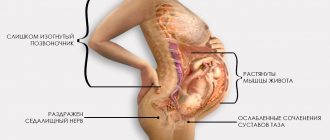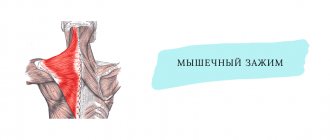Warning signs during pregnancy to immediately consult a doctor or call an ambulance.
During pregnancy, conditions often arise that require medical attention. Sometimes, when feeling unwell, it is difficult to know what to do: call an ambulance immediately or wait and make an appointment with your doctor. Sometimes such indecisiveness can lead to serious problems. In practice, there are a number of symptoms that cannot be ignored. Each of them can be a manifestation of pathology, in which it is necessary to immediately hospitalize the pregnant woman in a hospital. Let's look at these symptoms and associated pathologies.
Worrying symptoms during pregnancy
Bleeding is one of the most common reasons why pregnant women go to the emergency room - these are various bleeding associated with pregnancy or diseases of the reproductive organs.
Obstetric hemorrhage is a discharge mixed with blood or blood released from the genital tract of a woman during pregnancy, childbirth, or the postpartum period. The intensity and duration of such bleeding can vary greatly depending on the cause that caused it - from scanty blood smears on underwear to heavy and prolonged bleeding.
They can occur at any stage of pregnancy and when they appear, the patient most often feels general malaise, dizziness, and may experience lightheadedness or severe pain in the lower abdomen and lower back.
Causes of bleeding during pregnancy:
1. Spontaneous miscarriage or abortion - this pathology can occur at any stage of pregnancy, but the highest risk is during the first three months of pregnancy, at this time, for a variety of reasons, the pregnancy is threatened with termination, fetal rejection begins, the placenta is expelled, which may cause miscarriage. This is accompanied by the following symptoms: bloody discharge or bright scarlet blood appears from the genital tract, the woman feels acute pain, hypertonicity of the anterior wall of the uterus is noted - the stomach “turns to stone.”
Any manifestation of the first signs of a miscarriage is a reason to urgently seek medical help, and until the ambulance arrives, remain completely at rest, do not get up and take 1-2 tablets of antispasmodics (no-spa, metacin or a suppository with papaverine). With timely medical care, the chance of maintaining a pregnancy increases.
2. Placenta previa is a gynecological pathology in which the placenta is attached to the site where the fetus exits the uterus. This arrangement does not interfere with the normal growth and development of the child, but greatly increases the risk of bleeding.
Symptoms of placenta previa are unexpected bleeding or spotting that occurs despite complete well-being after the twentieth week of pregnancy. If such symptoms appear, you should immediately call an ambulance, while waiting for doctors, lie on your left side and try to give the lower half of your body an elevated position - put a pillow or something soft under your hips.
3. Premature placental abruption - “baby place” - is the connection between the unborn baby and the mother; if this connection is untimely disrupted, there is a serious threat to bearing the child. The risk of such a pathology increases in the last months of pregnancy; the first signs of threatening placental abruption are pain, bleeding from the genitals, weakness, hypertonicity of the uterus, and possible contractions.
If such symptoms appear, you should immediately call an ambulance until it arrives, try not to make unnecessary movements, lie down, apply a heating pad with ice to your lower abdomen, and do not take food or water.
Any discharge from the genitals mixed with blood in a pregnant woman is a sign of serious obstetric pathology, which may threaten not only the life of the unborn child, but also the life of the pregnant woman. Such symptoms are a clear indicator for emergency hospitalization in the gynecological department. While waiting for an ambulance for pregnant women, you need to stop all activities and be completely at rest.
Causes of increased nervousness in pregnant women
Physiological:
- changes in hormonal levels, which provoke excessive emotionality, irritability, tearfulness;
- manifestations of toxicosis: nausea, change in taste preferences;
- unpleasant physical sensations, especially in the last trimester of pregnancy.
Psychological:
- uncertainty about the future, financial problems, relationships with the child’s father;
- worries associated with pregnancy and impending birth.
Obviously, expectant mothers have plenty of reasons to worry. But doctors warn that pregnant women should try to be as nervous as possible. What are the dangers of stress during pregnancy?
Pain syndrome
Very often, bearing a child is accompanied by various pain sensations; this is due to physiological changes caused by hormonal changes for bearing a child. Such symptoms are not always pathological. But it is necessary to clearly distinguish between situations in which pain is simply an unpleasant symptom of a normal pregnancy or a sign of serious problems in the health of the pregnant woman and her child.
At the beginning of pregnancy, it is normal to experience mild pain in the lower abdomen, in the lower back - lower back, in the abdomen or in the enlarged mammary glands.
Such unpleasant sensations are associated with the pressure of the growing uterus on organs and blood vessels, with sprained ligaments, and with the restructuring of the mammary glands. They are short-term, not too intense and pass quickly.
If the pain is severe, cramping, does not go away for a long time, or occurs in the genital area, uterus or lumbar region, this condition requires qualified medical care and you need to take care of your health without delay.
If very severe pain occurs, it is recommended to call emergency help, and before the doctors arrive, go to bed and take antispasmodics - no-shpa, metacin, suppositories with papaverine.
Headache during pregnancy may be one of the first signs of gestosis . An ambulance should be called if signs of pathology appear, such as severe pressing pain in the temples or the back of the head, darkness in the eyes, flashing “spots” or multi-colored spots before the eyes, nausea and vomiting, increased blood pressure, unmotivated agitation or depression. All these are signs of developing gestosis - a special pathological condition of pregnant women that requires immediate medical intervention. In addition to headaches, gestosis causes a strong increase in blood pressure, swelling, and protein is detected in urine tests. In more complex cases, a severe deterioration of the patient’s general condition, short-term stupor or loss of consciousness, and the occurrence of convulsive movements are possible. If such symptoms occur, it is necessary to urgently call an ambulance for pregnant women. Before the doctors arrive, the patient should be placed in a dark room, in complete silence; to alleviate the condition, give an elevated position in bed and monitor the patient’s condition. If your doctor has prescribed medications that lower your blood pressure, you can take them before the ambulance arrives.
Surgical pathologies
Situations in which a person may need emergency medical intervention can arise at any time and in any place. During pregnancy, the risk of such problems is slightly higher than during any other pregnancy.
In order not to harm the child and his mother, you need to seek medical help as soon as possible and try to remain calm.
“Acute abdomen” is a collective term that unites a whole group of various diseases and pathologies of internal organs that arise in the abdominal cavity. Such conditions develop very quickly and for the patient to recover, she must be immediately taken to a surgical hospital for surgical intervention.
Symptoms of such surgical pathologies are severe cutting or dull pain in the abdominal cavity, their intensity increases over time, in addition, signs of disruption of the digestive tract appear - nausea, vomiting, restriction of muscle mobility of the anterior abdominal wall, stool retention may occur. In addition to the symptoms described above, the general state of health deteriorates greatly - the patient feels severe weakness, dizziness, her skin turns pale, she sweats profusely and her blood pressure drops.
Often, signs of inflammatory changes in the abdominal cavity may appear - increased body temperature, increased breathing and heart rate.
The development of such surgical pathology can be caused by a variety of diseases, both related to the female reproductive system and related to the pathology of internal organs:
1. Ectopic pregnancy - occurs when the fertilized egg is not attached correctly - not in the uterine cavity, but in the abdominal cavity or fallopian tube. Such an egg may develop for some time, but then its development stops and a spontaneous miscarriage occurs. This pathology becomes the most common cause of the development of an “acute abdomen” in pregnant women. When pregnancy develops outside the uterine cavity, the pregnant woman feels severe pain in the lower half of the abdomen, there is no regular menstrual flow, and vaginal discharge mixed with blood appears. With a developing ectopic pregnancy, complaints may be minimal - mild pain and spotting. An interrupted ectopic pregnancy causes the patient to be admitted to the hospital. This may cause rupture of the fallopian tube or other tissues. This provokes severe pain - a “dagger” pain in the lower abdomen occurs, and blood appears from the genitals. The woman feels a sharp deterioration in her health, arising from symptoms of internal bleeding - severe weakness, possible fainting, drop in blood pressure, pain shock.
2. Uterine rupture - this pathology occurs after surgery on the uterus - cesarean section, removal of tumors, excision of the uterine angle after removal of an ectopic pregnancy. Symptoms of this pathology are a change in the shape and contours of the abdomen, severe pain in a certain place; upon palpation, you can feel the edges of the tear and scar changes.
3. Torsion of an ovarian cyst - the occurrence of such a complication is possible in the presence of formations in the ovaries. A cyst is a benign formation in the ovary, which is a cavity with fluid; if the cyst is attached to the ovary with the help of a “leg,” then there is a risk of torsion of the cyst, which disrupts the blood supply, compresses the vessels and begins tissue death. This causes severe pain, which can be provoked by any physical activity, sexual intercourse or nervous strain. Scanty vaginal discharge also appears, and other symptoms of intoxication may be present.
4. Impaired blood supply to the fibroid node - if a pregnant woman is diagnosed with uterine fibroids, as the fetus grows, compression of the vessels feeding this formation is possible, this leads to disruption of the blood supply to the fibroids and the occurrence of constant dull pain in the area of the uterine fibroids.
5. Acute appendicitis - can occur at any time, up to 75% of cases of acute appendicitis in women expecting a child occur in the first months. Clinically, the disease manifests itself with a standard set of symptoms - pain in the epigastrium or in the lower third of the right abdomen. Upon examination, you can notice strong tension in the abdominal muscles. If help was not provided on time, nausea, vomiting, and a rise in body temperature occur.
6. Acute cholecystitis is an inflammatory disease of the gallbladder; it often develops in pregnant women; about 10% of all pregnant women suffer from disorders of the gallbladder, but most often the disease does not require medical attention. In case of exacerbation, the patient suffers from severe pain on the right side, radiating to the scapula and right shoulder, indomitable vomiting, which does not bring relief and deterioration of the patient’s general condition. In such cases, it is also necessary to contact emergency specialists.
7. Acute pancreatitis - occurs when the pancreas becomes inflamed. The main symptom of the disease is acute, sudden girdling pain or pain in the upper abdomen, severe nausea and vomiting, and a sharp rise in body temperature.
8. Perforation of a stomach or duodenal ulcer - if before pregnancy a woman was diagnosed with inflammation or ulcerative damage to the walls of the stomach or intestines, there is a danger of bleeding from damaged vessels or the formation of a hole in the wall of the organ - perforation. With this pathology, very severe stabbing pain, fainting, weakness occurs, and vomiting of blood is possible.
Before the ambulance arrives, in all the cases described above, it is necessary to ensure complete rest for the pregnant woman, put her on the bed and not give any painkillers and under no circumstances eat or drink until the doctors arrive. It is allowed to take antispasmodics - no-shpa, metacin - 1-2 tablets. You should not try to give an enema or flush the patient’s stomach yourself. It is also not recommended to take painkillers or laxatives - this can greatly distort the clinical picture of the disease and complicate its further diagnosis.
Experiences of pregnant women during the first trimester
07.07.2021
Pregnancy is a wonderful time for many women. Of course, cases are different. But for the most part, pregnancy is a reason for positive emotions, a special time that women never forget. Today's article will give an overview of the most basic and most common fears and worries that pregnant women experience in the first three months of their special situation.
When women learn about their situation, they are overcome by a variety of emotions. Fear, happiness, misunderstanding, worry - all this can wash over a woman in an instant. The first experience of pregnant women is that they need to tell their husband and family members about the pregnancy . How to do it? Will your husband be happy? What if the pregnancy is false? What if it fails? These are the questions that worry the ladies for the first couple of days. Once the information is conveyed to relatives, this reason for concern disappears. But the next pressing question arises. How to tell it and is it even worth sharing the news with your friends? It is very difficult to advise anything here. Each pregnant woman will feel for herself who needs to tell everything and when, and from whom such personal information can be hidden.
Next comes the time when you need to visit a local consultation to register. Women who are pregnant for the first time are afraid of this procedure. They don't understand how everything will happen. And this is also the basis and reason for worries. Those ladies who don’t like their local gynecologist . You shouldn't be afraid of this. Everything will go perfect.
After registration, it’s time to take tests . Moreover, tests . Many women are also worried about tests some deviations from the norm may be seen in the urine and blood And this is a reason for concern.
Until the time comes for the first ultrasound , the woman also has to worry a lot. For example, how is weight gain going, will there be toxicosis or not. This is especially exciting for working women. If they feel nauseous, they may be irritated and enraged by everything. Starting from people and ending with smells.
Before going for an ultrasound , pregnant women are very worried. Until the doctor announces that everything is fine with the fetus, it is very difficult for women to relax. And only after they see the image of their baby on the monitor screen, after the doctor gives a good conclusion, do women relax for a while.
In fact, pregnancy is not easy for women. You need to understand this and be prepared for the fact that there will be quite a few reasons for alarm!
Published in Pregnancy and pregnancy management Premium Clinic
Somatic diseases
Almost every person has certain pathologies in the functioning of internal organs, and for women, during pregnancy, the risk of developing an exacerbation of these diseases increases, which can lead to complications during pregnancy.
1. Renal colic - occurs when the outflow of urine from the urinary organs is impaired. The reason for this urinary retention may be the formation of kidney stones or chronic diseases of the urinary system. During renal colic, the patient suffers from very severe pain in the lower back, the pain is very strong, occurs suddenly and becomes more intense over time, in addition, the general condition of the patient is disrupted - swelling, headache, nausea and vomiting may occur. Before the ambulance arrives, you should not take liquid; you need to try to calm down and, if necessary, take antispasmodics - no-shpu, papaverine.
2. An attack of bronchial asthma - an attack of bronchial asthma can be triggered by physical activity, nervous shock, eating an allergen or other reasons. Shortness of breath occurs, the patient's breathing is noisy and wheezing, she is tormented by a feeling of fear and anxiety, and a panic attack may occur.
Before the doctors arrive, you need to sit the patient down, unfasten tight clothing, open the window, and immerse your hands and feet in hot water. It is possible to use inhaled forms of the drug to relieve swelling and spasm.
Childbirth
Even if the expectant mother has been preparing for the onset of labor pains and looking forward to this moment, unexpected signs of impending labor can take her by surprise and cause panic.
You need to contact an ambulance when regular labor occurs or after the amniotic fluid breaks.
Regular labor contractions repeat every 10-15 minutes, last at least 10-15 seconds, and their intensity and frequency increase all the time. If regular contractions appear at least once every 15-10 minutes, with a frequency of 20-10 seconds, or your water breaks, you need to call an ambulance, and before they arrive, try to calm down and collect the necessary things.
Check the presence of all documents - exchange card, passport, birth certificate, insurance policy or birth contract.
While there is time, you need to collect or check the availability of things necessary in the maternity hospital - socks, diapers, postnatal pads, postnatal panties, towels, toilet paper. Hygiene products, a robe, slippers, a nightgown are usually given out there, but if they allow it, you can bring your own, a notepad and pen, bepanten cream, drinking water, a pack of cookies and of course, all the documents). To prepare for childbirth, a woman in labor needs to trim her nails, remove jewelry, remove hair, and remove hair from intimate areas. It is not recommended to eat; it is better to drink some tea, juice or compote.
Prevention and control of stress
What can you do to calm down and stop getting nervous over trifles, thereby harming the health of your unborn baby? Let's name a few simple and effective remedies:
- Breathing exercises. To calm down, you need to use deep, measured breathing. Thanks to it, the muscles and organs of the whole body are enriched with oxygen. This leads to normalization of blood pressure, relieving muscle and emotional tension.
- Phytotherapy. Melissa, mint, valerian, and motherwort have a relaxing effect. You can make tea from these herbs and add the decoction to your bath.
- Aromatherapy. Essential oils of pine needles, citruses, and sandalwood will help a pregnant woman calm down.
- Strong physical activity . This could be a set of exercises for pregnant women, or just walking in the fresh air.
- Meditation and auto-training are ways to manage your physical and psychological state, based on the technique of self-hypnosis. To learn to relax and tune yourself into a positive mood, 10-15 minutes a day is enough.
- Massage. The expectant mother can massage her neck, head, ears, arms and even spine. This brings a calming effect and helps relieve tension.
- Proper nutrition . Often, increased nervousness during pregnancy is caused by a lack of vitamin B. It is necessary to regularly consume foods rich in this vitamin: milk, cheese, cottage cheese, sprouted grains, legumes, liver, herbs, vegetables.
- Positive environment . To avoid unnecessary stress, try to communicate more with positive, friendly people.
- Doing what you love, doing a hobby, has a beneficial effect . If you don’t have one, you can learn to do needlework, sewing, knitting. Repeated movements allow you to concentrate and distract from unpleasant experiences.
Expecting a child is one of the most beautiful moments in a woman’s life. Try to put aside negative experiences and fully enjoy how your new life grows. A happy and calm mother is the key to the birth of a healthy baby.








